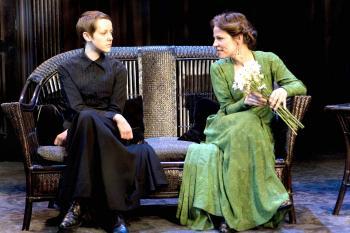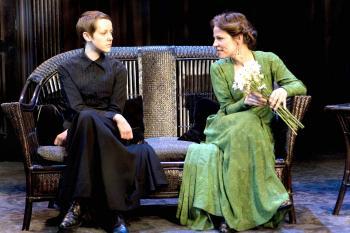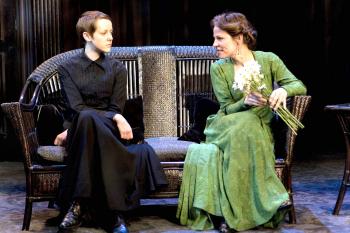NEW YORK—Eugene O’Neill’s “Mourning Becomes Electra” is a monumental work. Basing it on the Greek playwright Aeschylus’ Oresteia, the Nobel and Pulitzer prize-winning Irish-American playwright has put his own spin on the saga, moving it from ancient Greece to severe, judgmental New England, right after the Civil War.
Residing in the small town’s most elegant home, the wealthy and high-status Mannons (patriarch Ezra Mannon is a former judge), grudgingly respected by the community, have secrets to hide. Given their puritanical outlook, guilt pervades the entire family, inevitably resulting in passionate and ultimately tragic outbreaks. Early intimations of greed, jealousy, lust, adultery, incest, madness, suicide, and the ultimate crime—murder, finally come to pass.
Doomed to become victims of their heredity and personal history, the family story begins prior to the first act. Before Ezra Mannon was even born, his father Abe and uncle David had both fallen in love with a nurse working for the family, Marie Brantome. When she becomes pregnant by David and gives birth to a son, Abe, in a jealous rage, throws David out and cheats him of his inheritance. Both Marie and David come to a sad end.
Now the play begins. The war has recently ended. Ezra Mannon (Mark Blum), a Brigadier-General in General Grant’s army, is due to return home. He could not be less welcome to his wife, Christine (Lili Taylor), who has, in his absence, taken a lover, none other than Adam Brant, nee Brantome (Anson Mount).
Residing in the small town’s most elegant home, the wealthy and high-status Mannons (patriarch Ezra Mannon is a former judge), grudgingly respected by the community, have secrets to hide. Given their puritanical outlook, guilt pervades the entire family, inevitably resulting in passionate and ultimately tragic outbreaks. Early intimations of greed, jealousy, lust, adultery, incest, madness, suicide, and the ultimate crime—murder, finally come to pass.
Doomed to become victims of their heredity and personal history, the family story begins prior to the first act. Before Ezra Mannon was even born, his father Abe and uncle David had both fallen in love with a nurse working for the family, Marie Brantome. When she becomes pregnant by David and gives birth to a son, Abe, in a jealous rage, throws David out and cheats him of his inheritance. Both Marie and David come to a sad end.
Now the play begins. The war has recently ended. Ezra Mannon (Mark Blum), a Brigadier-General in General Grant’s army, is due to return home. He could not be less welcome to his wife, Christine (Lili Taylor), who has, in his absence, taken a lover, none other than Adam Brant, nee Brantome (Anson Mount).







